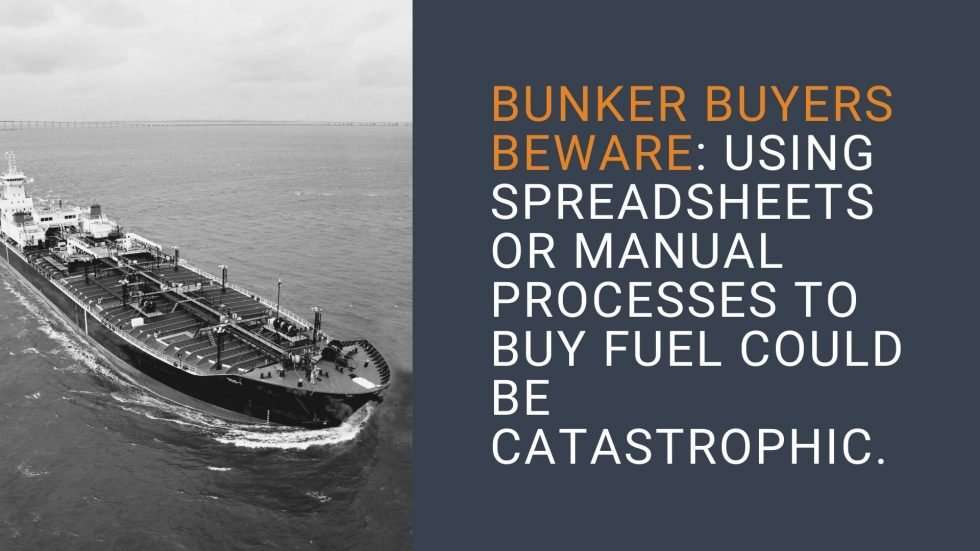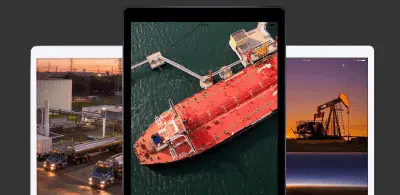Bunker buyers beware: using spreadsheets or manual processes to buy fuel could be catastrophic. - Inatech
- February 9, 2022
- Posted by: Tom Hedge
- Blogs

When talking to prospects I still find many operators buying marine fuel using manual processes or simple spreadsheets.
Buying bunkers is getting more complex. There are more products on the market than ever before, more suppliers to choose from and more regulations being introduced, putting operators are under intense pressure to remain compliant.
Add to these challenges the pressure of buying fuel manually or relying on old outdated processes or systems and it becomes clear that these operators are missing out on deals, will often pay more for products, are risking buying non-compliant fuels and are putting themselves in a position where managing finances, or tracking and handling claims is difficult and time consuming.
If you find your business in this position – what are the options?
Reduce the risks of buying fuel by moving away from spreadsheets/outdated processes.
By relying heavily on manual processes and working with spreadsheets operators are often trying to juggle information from many sources (including suppliers and market data providers) while assessing inventory availability of fleets and handling bunker requests from ship operators along ship routes around the world.
These challenges present two risks:
- The first is the practical issues of multiple people accessing one spreadsheet, namely:
- Input errors, duplication of effort, issues of file control, potential corruption of extremely important files, audit challenges and the fact management don’t have an easy-to-access, consolidated view of the business.
- The second, the operational issues of not having information immediately available, resulting in:
- Vessels bunkering in ports where fuel prices are high rather than alternative ports offering lower prices.
- The capacity of the vessel often being underutilized.
- Bunker requests to procure fuel that are not received by traders on time.
- Bunkering more fuel than required for a round trip
Automation simplifies fuel management.
In order to avoid these costly errors, we are seeing more and more buyers turn to technology and specialist fuel management software. This not only eliminates many of the risks, it is a way to drive improvements in operational efficiency and reduce costs.
Such systems address the practical errors of using spreadsheets by automating many manual tasks, improving security, speeding up reporting, providing a consolidated view of the business, and so offering faster, more accurate reporting and better decision support via real-time data and analysis tools.
With the potential risks of using spreadsheets high, is fuel management software a better alternative?
Even for the small operators with very few ships the answer is yes, as they can benefit from simply automating fuel planning and purchasing processes. However as the size of operator grows and the complexity of fuel purchasing increases, the risk of relying on labour-intensive, outmoded processes and spreadsheets really starts to impact the business, making the cost-benefits of automation more significant and the switch to specialist fuel management software hugely beneficial.
Inatech offers fuel management products for small and large ship operators
As a specialist fuel management software company we have software products designed for a range of ship operators from dry bulk/cargo, to tanker and containers.
If you have less than 40 vessels then ShiptechLite is the product for you. ShiptechLite is Inatech’s latest bunker fuel planning and bunker fuel procurement app designed to meet the fuel purchasing needs of small to medium sized operators and to eliminate a reliance on manual processes, spreadsheets or old legacy systems.
And for operators with more than 40 vessels our functionality rich full Shiptech product is the right choice. Shiptech is Inatech’s end-to-end fuel management software. It delivers the insights and data shipping companies need to make informed fuel purchasing decisions based on fuel price, quality, compatibility and availability. At its core is a comprehensive range of applications covering everything from procurement, contracts and planning to finance, labs, claims and reconciliation.
For more information on either product click here.


